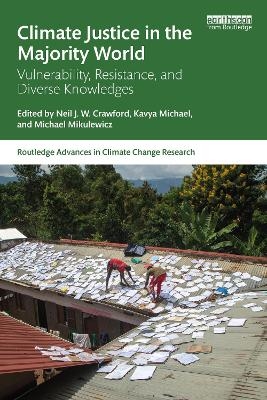
Climate Justice in the Majority World
Routledge (Verlag)
978-1-032-10180-4 (ISBN)
This edited collection explores a diverse range of climate (in)justice case studies from the Majority World – where most of humans and non-humans live. It is also the site of the most severe impacts of climate change and home to some of the key solutions for the climate crisis. The collection brings together 12 chapters featuring the work of over 30 authors from around the globe.
The impacts of climate change are disproportionately affecting individuals, communities, and countries in the Majority World who historically have contributed little to rising global temperatures. The 12 chapters focus on a range of cross-cutting themes, demonstrating both individual and collective experiences of climate change and struggles for achieving climate justice from the Majority World. This includes activism, resistance, and social movement organizing in India and Brazil; lived experiences and understandings of frontline communities in Bangladesh and South Africa; consequences of and responses to disasters in Mozambique and Puerto Rico; and contested accounts, narratives, and futures in the Maldives and Pakistan, among other topics.
By adopting a decolonial lens, this book provides rich empirical content, insightful comparisons, and novel conceptual interventions. It foregrounds climate justice from an intersectional perspective and contributes to the ongoing efforts by scholars and activists to address epistemic injustice in climate change research, policy, and practice. It will appeal to undergraduate and graduate-level students, academics, activists, policymakers, and members of the public concerned with the impacts and inequalities of climate change in the Majority World.
Neil J. W. Crawford is a research fellow in climate action and member of the Priestley Centre for Climate Futures, University of Leeds, UK. Their research focuses on forced migration and displacement, refugee rights, climate justice, and the inequalities of climate change, gender and sexuality, and cities. Kavya Michael is an environmental-social scientist at Chalmers University of Technology, Sweden. Her research broadly examines environmental change and energy-related issues through a human rights and justice lens. She studies the multiple intersections of climate change, urban inequality, informality, and inter- and intraregional migration with a focus on the Global South. Michael Mikulewicz is an assistant professor at the Department of Environmental Studies at the State University of New York College of Environmental Science and Forestry (SUNY ESF). Michael is a human geographer who applies critical theory to study issues of climate and environmental (in)justice, adaptation, and urban sustainability.
Introduction: Climate Justice beyond the Minority World – Towards Decolonial Knowledges
Kavya Michael, Michael Mikulewicz, and Neil J. W. Crawford
1. Southern Climate Justice Activism in the Context of an Energy Transition: Forest Rights over Coal in Mahan, Central India
Ruchira Talukdar and Priya Pillai
2. Extreme Climatic Events and Climate Change Policies:A Call for Climate Justice Action in Mozambique
José Maria do Rosário Chilaúle Langa, Natacha Bruna, Boaventura Monjane, Giverage do Amaral, Elton Augusto da Amélia Fé, Bento Paulo Rafael, Patricia Figueiredo Walker, and Patricia E. Perkins
3. The Intersection of Climate Justice and Agroecology in Puerto Rico Post-Hurricane Maria: Voices from the Ground
Thelma I. Vélez
4. ‘I was poor before, but Cyclone Amphan left me destitute’: Disaster Displacement and Support in Bangladesh
Neil J. W. Crawford, Siddiqur Rahman, Tanzina Nazia, Sennan David Mattar, and Ukegbu Uwa Kalu
5. The Green Climate Fund as an Elaborate Scheme of Generating Social Harms
Jessica Omukuti and Aidan O’Sullivan
6. Climate Justice in Latin America: Mapping the Key Emerging Debates
Lira Luz Benites Lazaro, Zenaida Luisa Lauda-Rodriguez, Susanne Börner, Andrea Lampis, and Leandro Luiz Giatti
7. Socioecological Conflicts and Resistances: The Platformization of Climate Justice Activism in Brazil
Caio Penko Teixeira
8. Resisting Dispossession and Destruction: Climate (In)justice and Wind Extraction Frontier in the Postcolonial Indian State
David Singh
9. The Marginality of the Plainland Indigenous Communities in Climate Change Plans and Finance in Bangladesh
Siddiqur Rahman and A. K. M. Mamunur Rashid
10. Ethical Dimensions of Climate and Environmental Issues in Pakistani Media
Shafiq Ahmad Kamboh, Muhammad Ittefaq, Sadia Jamil, and Bushra Hameedur Rahman
11. Socioecological Entanglements, Invasive Ecology, and Climate Injustice: A Story of Cape Town, South Africa
Grace D. O’Donovan
12. Resisting Narratives of Future Foreclosure: Rethinking Adaptation and Resilience in Favour of Climate Justice in the Maldives
Africa Bauzà Garcia-Arcicollar
Conclusion: Towards Justice in Climate Justice Research – Feedback from Chapter Contributors
Michael Mikulewicz, Kavya Michael, and Neil J. W. Crawford
Index
| Erscheinungsdatum | 02.08.2023 |
|---|---|
| Reihe/Serie | Routledge Advances in Climate Change Research |
| Zusatzinfo | 8 Tables, black and white; 15 Line drawings, black and white; 6 Halftones, black and white; 21 Illustrations, black and white |
| Verlagsort | London |
| Sprache | englisch |
| Maße | 156 x 234 mm |
| Gewicht | 720 g |
| Themenwelt | Naturwissenschaften ► Biologie ► Ökologie / Naturschutz |
| Weitere Fachgebiete ► Land- / Forstwirtschaft / Fischerei | |
| ISBN-10 | 1-032-10180-6 / 1032101806 |
| ISBN-13 | 978-1-032-10180-4 / 9781032101804 |
| Zustand | Neuware |
| Informationen gemäß Produktsicherheitsverordnung (GPSR) | |
| Haben Sie eine Frage zum Produkt? |
aus dem Bereich


